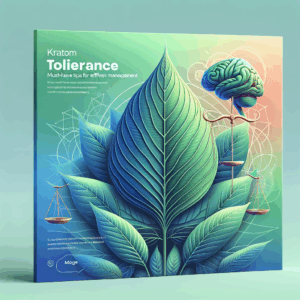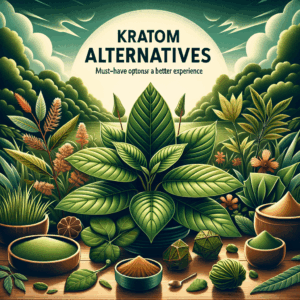
Kratom Withdrawal: Effortless Guide to the Best Relief
- Understanding Kratom and Its Popularity
- What Causes Kratom Withdrawal?
- Signs of Withdrawal
- Short-Term Relief Strategies
- Hydration
- Nutrition
- Natural Supplements
- Long-Term Relief Strategies
- Gradual Tapering
- Support Networks
- Mental Health Care
- Medical Interventions
- Detox Programs
- Medication-Assisted Treatment
- Enhancing Recovery
- Mindfulness and Meditation
- Exercise
- Journaling
- Finding Professional Help
- Choosing the Right Professional
- Questions to Ask
- Prevention of Relapse
- Identifying Triggers
- Developing Healthy Coping Mechanisms
- Conclusion
- FAQs
- References
Understanding Kratom and Its Popularity

Kratom, a tropical tree native to Southeast Asia, has gained popularity worldwide for its stimulant and sedative effects. Many people consume it in various forms, including powders, capsules, and teas. Users often seek relief from pain, anxiety, and even opioid withdrawal. The appeal lies in its perceived benefits, but there’s a less discussed side: withdrawal symptoms that may occur upon cessation.
What Causes Kratom Withdrawal?
Kratom affects the body by interacting with opioid receptors, similar to substances like morphine or codeine. While users report feelings of euphoria, a dependency can develop over time. Regular consumption alters the brain’s chemistry, leading to a variety of withdrawal symptoms when one stops suddenly.
These symptoms can range from mild to severe. The intensity often depends on the frequency of use, dosage, and personal physiology. Common symptoms include fatigue, irritability, nausea, and muscle aches. For some, these symptoms can be quite intense.
Signs of Withdrawal
Recognizing the signs of kratom withdrawal is crucial for finding effective relief. The symptoms typically begin within 12 to 24 hours after the last dose. Here are some common signs to watch for:
– Physical Symptoms: Muscle pain, sweating, and gastrointestinal issues like diarrhea.
– Mental Symptoms: Anxiety, depression, and mood swings.
– Sleep Disruption: Insomnia or restless sleep can also be prevalent.
Understanding these signals allows users to plan for a transition period. Preparation can significantly reduce the discomfort experienced during withdrawal.
Short-Term Relief Strategies
When dealing with kratom withdrawal, immediate relief can provide comfort. Though the cravings can be strong, there are short-term strategies one might consider. Adjusting your lifestyle and habits can have a remarkable impact.
Hydration
Staying hydrated will help flush out toxins from your system. Water, herbal teas, and electrolyte drinks are excellent choices. Avoid caffeine, as it can exacerbate anxiety.
Nutrition
Eating a balanced diet enhances your overall well-being. Focus on whole foods that provide essential nutrients. Foods rich in fiber and protein can stabilize energy levels and mood. Foods like bananas and avocados can help replenish vital electrolytes.
Natural Supplements
Some natural supplements may aid in alleviating withdrawal symptoms. Here are a few that users commonly report as helpful:
– Magnesium: Known to reduce muscle cramps.
– Ginger: A natural remedy for nausea.
– Melatonin: Aids in promoting better sleep.
These options can complement your withdrawal journey. However, it’s important to consult with a healthcare professional before trying new supplements.
Long-Term Relief Strategies
Overcoming kratom withdrawal takes time and adequate support. Implementing long-term strategies can pave the way for sustained recovery.
Gradual Tapering
One effective strategy is gradually tapering off kratom rather than stopping abruptly. This approach can ease the transition period. Gradually reducing the dosage over time can minimize withdrawal symptoms.
Create a schedule that gradually decreases your daily intake. For instance, if you take 8 grams daily, reduce it to 6 grams for a week. Then, lower to 4 grams the following week, and so on. Keep adjusting based on how your body responds.
Support Networks
Engaging with supportive communities can be a lifeline during withdrawal. Many forums and online groups offer advice and encouragement. Connecting with others who understand your struggle can provide comfort and accountability.
In-person support groups also exist. These groups can help you share experiences and learn from others’ journeys. Look for local or virtual meetings to join.
Mental Health Care
Mental health plays a crucial role in overcoming withdrawal. Regular counseling or therapy can provide coping strategies and emotional support. Cognitive-behavioral therapy (CBT) is often effective for addiction-related issues.
Consider seeking guidance from a mental health professional specializing in addiction. They can offer tailored strategies and resources to aid your recovery.
Medical Interventions
For some individuals, professional intervention becomes necessary. Withdrawal can be severe enough to require medical assistance. There are various treatment options available depending on the severity of the withdrawal symptoms.
Detox Programs
Detox programs offer a structured environment for the withdrawal process. Medical professionals monitor patients closely. They can administer medications to alleviate symptoms and reduce cravings.
These programs generally last from a few days to several weeks. The duration of treatment depends on individual needs. Consulting with a medical provider can help you determine if this option is suitable for you.
Medication-Assisted Treatment
In some cases, healthcare providers may prescribe medications to manage withdrawal symptoms. Options can include:
– Buprenorphine: Often used in opioid addiction treatment.
– Clonidine: Helps reduce anxiety and physical symptoms.
– Naltrexone: Blocks the effects of opioids, reducing cravings.
Always discuss with your healthcare provider before beginning any new medication. They can provide information on potential risks and benefits.
Enhancing Recovery
Recovery is more than just overcoming physical symptoms. It involves developing coping strategies for cravings and stress. Here are some effective techniques to enhance your recovery journey.
Mindfulness and Meditation
Practicing mindfulness and meditation can ground you during difficult moments. These techniques promote relaxation and focus. Incorporate short sessions into your daily routine. Over time, they can help reduce anxiety and improve your mental clarity.
Exercise
Physical activities can significantly improve your mood and energy levels. Regular exercise releases endorphins, which act as natural mood lifters. Activities like running, swimming, or yoga can be beneficial.
Create a simple routine tailored to your fitness level. Even short, daily walks can contribute positively to your recovery.
Journaling
Writing down thoughts and feelings can be a therapeutic outlet. Journaling allows you to process emotions and track your recovery progress. It can also serve as a reminder of your goals and motivations.
Set aside a few minutes each day to write. Reflect on your challenges and successes to foster a sense of accomplishment.
Finding Professional Help
Seeking professional help should never be stigmatized. Mental health and addiction specialists can provide tailored care. They can help develop personalized plans for managing withdrawal symptoms effectively.
Choosing the Right Professional
When considering professional help, look for a healthcare provider with experience in addiction treatment. Ask about their approach and methods. This will ensure their philosophy aligns with your recovery goals.
Questions to Ask
Before choosing a treatment plan, consider these questions to guide your conversations with potential providers:
1. What experience do you have with kratom withdrawal?
2. What treatment options do you recommend?
3. How do you measure progress during treatment?
4. What kind of support does your facility provide after detox?
5. What strategies do you use to manage cravings?
Asking these questions can clarify expectations and help you feel more comfortable with your choice of care.
Prevention of Relapse
Once you’ve overcome withdrawal, the focus shifts to preventing relapse. Understanding your triggers and developing strategies can empower your recovery.
Identifying Triggers
Identifying situations and emotions that trigger cravings can be invaluable. Reflect on what times you feel tempted to use kratom again. Is it stress, boredom, or social situations?
Keeping a trigger diary can help track patterns. Knowing your triggers allows you to develop specific coping strategies.
Developing Healthy Coping Mechanisms
Replace unhealthy habits with positive alternatives. Explore hobbies, such as painting, hiking, or cooking. Engage in something that offers fulfillment and distraction.
Also, build a support network. Share your experiences with friends and family. Their encouragement can help you stay committed.
Conclusion
Dealing with kratom withdrawal might feel overwhelming at times, but you are not alone. By understanding withdrawal symptoms and employing both short and long-term strategies, you can navigate this challenging time. Access to support networks and professional treatment can further aid your recovery journey.
Additionally, identify and work towards effective prevention strategies. Armed with knowledge and tools, you can achieve lasting relief and find balance. Embrace the journey toward recovery and well-being.
FAQs
1. How long does kratom withdrawal last?
Generally, withdrawal lasts 1-2 weeks, although some symptoms may persist longer.
2. Can withdrawal symptoms be fatal?
While kratom withdrawal is not typically life-threatening, severe symptoms can require professional care.
3. What is the best way to taper off kratom?
Gradually reduce your dosage over time. Follow a systematic plan tailored to your consumption habits.
4. Are there any medications specifically for kratom withdrawal?
Yes, medications like buprenorphine and naltrexone may help manage withdrawal symptoms.
5. Can a detox program help with kratom withdrawal?
Yes, medical detox programs provide a safe and supportive environment for overcoming withdrawal symptoms.
6. How effective is therapy for kratom withdrawal?
Therapy can be quite effective in managing cravings and developing coping strategies.
7. Are there any natural remedies for kratom withdrawal?
Some individuals find relief through herbal supplements like ginger or magnesium.
8. Will exercise help with withdrawal symptoms?
Yes, regular exercise can significantly boost your mood and alleviate stress.
9. How important is hydration during withdrawal?
Staying hydrated is critical as it helps to flush out toxins and can alleviate certain symptoms.
10. Where can I find support groups for kratom withdrawal?
Online forums and local community centers often have support groups specializing in substance use recovery.
References
– Substance Abuse and Mental Health Services Administration (SAMHSA): Recovery and Support.
– National Institute on Drug Abuse (NIDA): Understanding Drug Use and Addiction.
– American Psychological Association (APA): The Benefits of Therapy.
– Mayo Clinic: Withdrawal Symptoms Overview.


